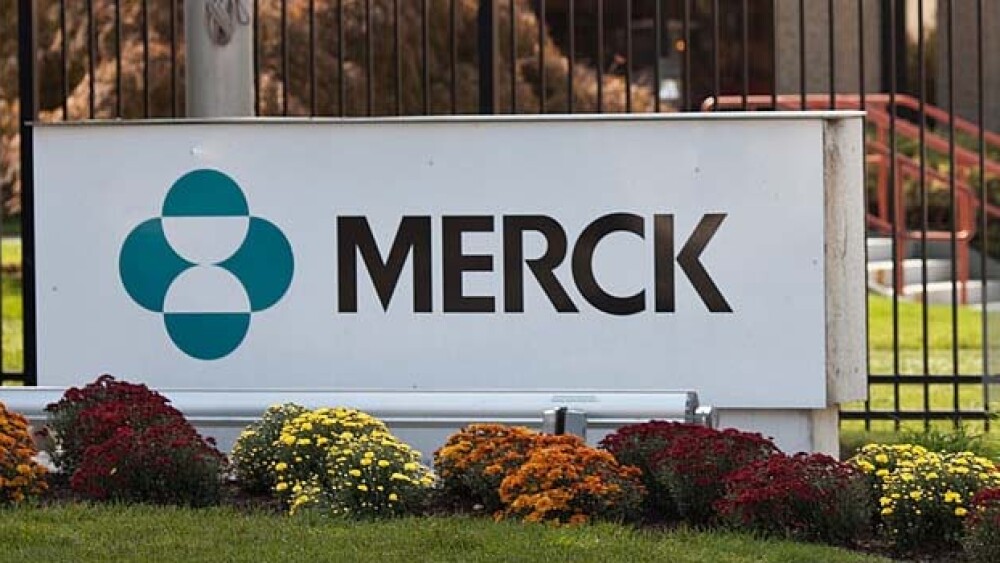Merck appears to be on the way to securing an additional approval for Keytruda, its blockbuster checkpoint inhibitor. The company is seeking new regulatory approval for Keytruda, an anti-PD-1 therapy, in combination with Eli Lilly’s Alimta and platinum chemotherapy as a first-line lung cancer treatment.
Merck appears to be on the way to securing an additional approval for Keytruda, its blockbuster checkpoint inhibitor. The company is seeking new regulatory approval for Keytruda, an anti-PD-1 therapy, in combination with Eli Lilly’s Alimta and platinum chemotherapy as a first-line lung cancer treatment.
If approved by the U.S. Food and Drug Administration (FDA), the supplemental Biologics License Application would make the combination treatment a first-line choice for patients with metastatic nonsquamous non-small cell lung cancer (NSCLC). After granting Keytruda Priority Review status, the FDA set a PDUFA date of Sept. 23, 2018.
The latest quest for a new approval for Keytruda is based on results from the Phase III Keynote-189 clinical trial, announced earlier this month. Data from the Phase III trial showed that the addition of Keytruda, Alimta and platinum chemotherapy significantly improved overall survival (OS) in the NSCLC patients and reduced the risk of death by half when compared with chemotherapy alone. An OS benefit was observed regardless of PD-L1 expression in the three PD-L1 categories that were evaluated, Merck said at the time the Phase III results were released.
Not only is Merck seeking regulatory approval for the additional indication of Keytruda in the United States, the company has also submitted the data for review in Europe and Japan. If approved by the FDA, this would mark the third indication for KEYTRUDA in metastatic NSCLC in the United States based on OS data, Merck said.
Roger M. Perlmutter, president of Merck Research Laboratories, said Keytruda is the first immunotherapy to significantly extend survival of patients with nonsquamous non-small cell lung cancer in combination with chemotherapy as a first-line treatment, including in patients whose tumors are either PD-L1 negative or are untested.
NSCLC is the most common type of lung cancer. It accounts for about 85 percent of all cases. The five-year survival rate for patients diagnosed in the United States with any stage of lung cancer is estimated to be 18 percent, according to data shared by Merck. If Merck is able to secure approval for Keytruda for this lung cancer indication it will open up a larger market share for the company. Sales of Keytruda generated more than $3.8 billion for Merck in 2017.
Keytruda also snagged another significant clinical milestone this month for NSCLC. Following an interim review of data in the KEYNOTE-042 trial, the anti-PD-1 therapy hit its endpoints as a first-line monotherapy. The interim analysis showed Keytruda met its key endpoint of overall survival in patients with locally advanced or metastatic non-small cell lung cancer (NSCLC), which includes including nonsquamous or squamous histology.
Keytruda has been approved by the U.S. Food and Drug Administration for multiple cancer indications, including melanoma, head and neck cancer and several types of lung cancer.
Merck announced the positive news about Keytruda one day in advance of the company’s quarterly report, which is scheduled for May 1. Analysts have suggested that one of the key points investors will focus on for the first quarter is the potential success of Keytruda as a first-line treatment of NSCLC patients, according to an analysis by The Street. Analysts with Credit Suisse have projected 2022 sales of Keytruda to pass $10 billion, which would make up 22 percent of the company’s total revenue. There is some concern among investors though that Merck could be focusing too much attention on Keytruda to the exclusion of other potential revenue drivers.





